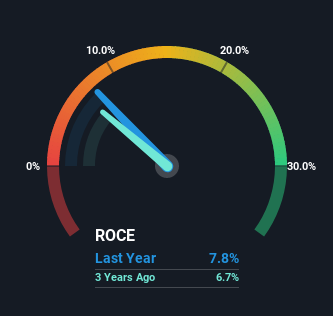- Greece
- /
- Healthcare Services
- /
- ATSE:IATR
Athens Medical C.S.A (ATH:IATR) Is Reinvesting At Lower Rates Of Return

Did you know there are some financial metrics that can provide clues of a potential multi-bagger? Firstly, we'd want to identify a growing return on capital employed (ROCE) and then alongside that, an ever-increasing base of capital employed. This shows us that it's a compounding machine, able to continually reinvest its earnings back into the business and generate higher returns. However, after briefly looking over the numbers, we don't think Athens Medical C.S.A (ATH:IATR) has the makings of a multi-bagger going forward, but let's have a look at why that may be.
Return On Capital Employed (ROCE): What Is It?
For those that aren't sure what ROCE is, it measures the amount of pre-tax profits a company can generate from the capital employed in its business. Analysts use this formula to calculate it for Athens Medical C.S.A:
Return on Capital Employed = Earnings Before Interest and Tax (EBIT) ÷ (Total Assets - Current Liabilities)
0.078 = €21m ÷ (€412m - €138m) (Based on the trailing twelve months to June 2022).
So, Athens Medical C.S.A has an ROCE of 7.8%. In absolute terms, that's a low return but it's around the Healthcare industry average of 8.5%.
View our latest analysis for Athens Medical C.S.A

Historical performance is a great place to start when researching a stock so above you can see the gauge for Athens Medical C.S.A's ROCE against it's prior returns. If you'd like to look at how Athens Medical C.S.A has performed in the past in other metrics, you can view this free graph of past earnings, revenue and cash flow.
What Does the ROCE Trend For Athens Medical C.S.A Tell Us?
On the surface, the trend of ROCE at Athens Medical C.S.A doesn't inspire confidence. Over the last five years, returns on capital have decreased to 7.8% from 18% five years ago. However, given capital employed and revenue have both increased it appears that the business is currently pursuing growth, at the consequence of short term returns. And if the increased capital generates additional returns, the business, and thus shareholders, will benefit in the long run.
On a side note, Athens Medical C.S.A has done well to pay down its current liabilities to 34% of total assets. That could partly explain why the ROCE has dropped. What's more, this can reduce some aspects of risk to the business because now the company's suppliers or short-term creditors are funding less of its operations. Since the business is basically funding more of its operations with it's own money, you could argue this has made the business less efficient at generating ROCE.
In Conclusion...
In summary, despite lower returns in the short term, we're encouraged to see that Athens Medical C.S.A is reinvesting for growth and has higher sales as a result. These trends are starting to be recognized by investors since the stock has delivered a 28% gain to shareholders who've held over the last five years. Therefore we'd recommend looking further into this stock to confirm if it has the makings of a good investment.
Since virtually every company faces some risks, it's worth knowing what they are, and we've spotted 3 warning signs for Athens Medical C.S.A (of which 1 is concerning!) that you should know about.
If you want to search for solid companies with great earnings, check out this free list of companies with good balance sheets and impressive returns on equity.
If you're looking to trade Athens Medical C.S.A, open an account with the lowest-cost platform trusted by professionals, Interactive Brokers.
With clients in over 200 countries and territories, and access to 160 markets, IBKR lets you trade stocks, options, futures, forex, bonds and funds from a single integrated account.
Enjoy no hidden fees, no account minimums, and FX conversion rates as low as 0.03%, far better than what most brokers offer.
Sponsored ContentNew: Manage All Your Stock Portfolios in One Place
We've created the ultimate portfolio companion for stock investors, and it's free.
• Connect an unlimited number of Portfolios and see your total in one currency
• Be alerted to new Warning Signs or Risks via email or mobile
• Track the Fair Value of your stocks
Have feedback on this article? Concerned about the content? Get in touch with us directly. Alternatively, email editorial-team (at) simplywallst.com.
This article by Simply Wall St is general in nature. We provide commentary based on historical data and analyst forecasts only using an unbiased methodology and our articles are not intended to be financial advice. It does not constitute a recommendation to buy or sell any stock, and does not take account of your objectives, or your financial situation. We aim to bring you long-term focused analysis driven by fundamental data. Note that our analysis may not factor in the latest price-sensitive company announcements or qualitative material. Simply Wall St has no position in any stocks mentioned.
About ATSE:IATR
Athens Medical C.S.A
Offers healthcare services in Greece and internationally.
Mediocre balance sheet and slightly overvalued.
Market Insights
Community Narratives




